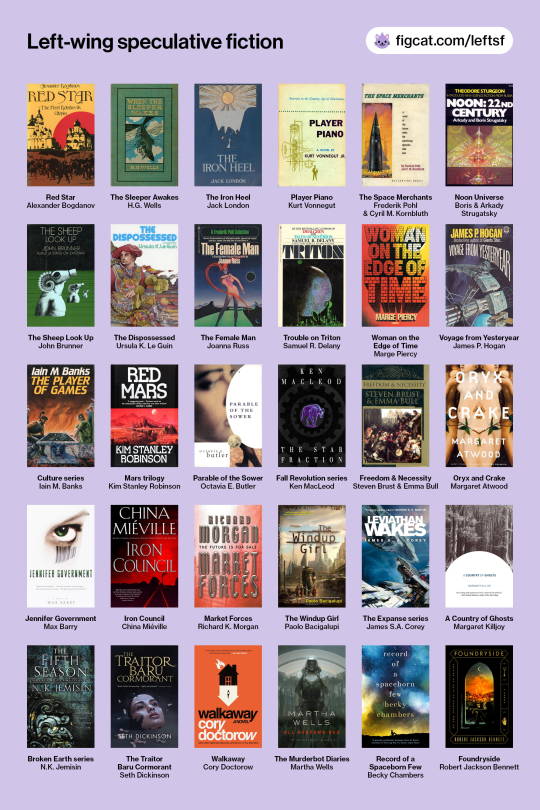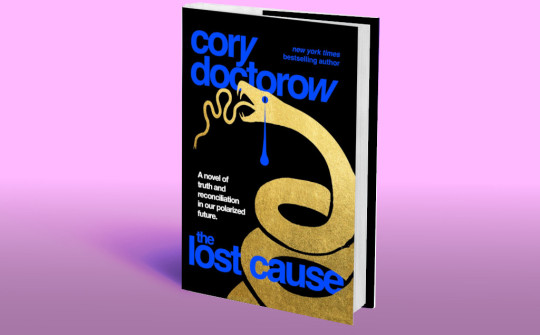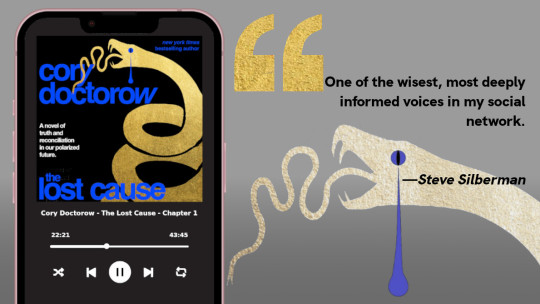#kim stanley robinson
Text

Kim Stanley Robinson, Green Mars
159 notes
·
View notes
Text
One weird trick to make monopolies self-destruct

Kim Stanley Robinson’s 2020 novel Ministry For the Future was a groundbreaking work: it’s the tale of a detailed, plausible transition from a world on a collision course with civilization-ending climate catastrophe to one where the challenge is met, with humanity collectively deciding to save itself:
https://pluralistic.net/2020/12/03/ministry-for-the-future/#ksr
Robinson’s book is important: it not only disproves the (variously attributed) capitalist realism aphorism that “it is easier to imagine the end of the world than it is to imagine the end of capitalism” — it also imagines the means by which that ending was brought about.
It’s a tale of what I’ve called “The Swerve”: the day we stop listening to the first class passengers at the front of the bus that’s barreling towards a cliff, rush the driver and yank the wheel before we go over the edge:
https://locusmag.com/2022/07/cory-doctorow-the-swerve/
Since the book’s publication, it has been the subject of intense foment, such as the excellent Crooked Timber seminar on the book’s strengths, flaws, and future:
https://pluralistic.net/2021/05/12/seminar-for-the-future/#imaginations
The latest project inspired by the book comes from NESTA and The Prospect: Minister For the Future is a series of policy proposals to someone holding that office, as proposed in Robinson’s novel, for dealing with inequality, food, demographics, networks, mental health, automation, pandemics, health, and other subjects:
https://www.prospectmagazine.co.uk/specialreports/minister-for-the-future
I also contributed a piece: “Enticing monopolies to unwind themselves,” which addresses the existential risk of monopolies: when monopolies reign, it is all but impossible to make good policy, because the monopolists can outbid all comers and turn every truth-seeking exercise into an auction that they win:
https://www.prospectmagazine.co.uk/politics/enticing-monopolies-to-unwind-themselves
That is, after all, the story of the climate emergency itself: a handful of giant firms colluding to distort science, delay action — and risk billions of lives to make trillions of dollars. Monopolies create superdense concentrations of power that, like a black hole, warp the normal rules:
https://pluralistic.net/2022/12/05/eldritch-physics/#wouldnt-start-from-here
The best time to tackle monopolies would have been 40 years ago, when all over the world, regulators stopped enforcing anti-monopoly law. The second best time is now. Lucky for us, antitrust regulators have the bit between their teeth and have vowed to halt the march towards market concentration, blocking mergers rather than waving them through:
https://pluralistic.net/2021/08/13/post-bork-era/#manne-down
They’ve also promised to take on existing monopolies, unwinding the predatory acquisitions and anti-competitive mergers that produced so much concentration in so many industries, which now rule over their regulators, hurting us in a million ways with utter impunity:
https://www.openmarketsinstitute.org/learn/monopoly-by-the-numbers
But while breaking up monopolies is important work, it’s also slow work. It took 69 years to break up AT&T!
https://doctorow.medium.com/podcasting-jam-to-day-c451dd289f2
Blocking future monopolies without ending existing ones is a huge risk. Any monopoly in an industrial supply chain can destroy the smaller firms it buys from and sells to. Think of how Big Pharma’s mergers let it gouge hospitals on drug prices, leading to regional hospital monopolies that had the bargaining power to push back. But then those hospitals turned around and started screwing insurers, who also formed regional monopolies in order to defend themselves from price-gouging.
In the end, monopoly leads to monopoly, with workers and consumers at either end of the supply chain, unorganized and vulnerable, which is why health workers make less money under worse conditions and patients spend more money for worse care. It’s not enough to prevent future monopolies — we also have to break up the ones that are all around us.
How can we make that happen without waiting 69 years while the monopolists use their vast cash reserves and influence to delay the reckoning? That’s where my proposal comes in.
https://www.prospectmagazine.co.uk/politics/enticing-monopolies-to-unwind-themselves
I am old enough to remember when corporate raiders took over companies in order to break them up and sell them for parts, rather than merging them into monopolies. Rapacious, remorseless finance assholes once stalked the corporate world, shattering firms with impunity.
What if we brought those monsters out of retirement for one more job?
My proposal is simple: a two-year capital gains tax holiday on profits from unwinding any 21st century merger involving a firm with more than £10b in market cap: “Watch them do in months what decades of courtroom grinding couldn’t hope to accomplish.”
This is a very Ministry For the Future kind of idea — one of the novel’s subplots involves bribing oil companies to leave oil in the ground by buying up all their stranded assets, and swallowing the galling proposition of giving still more money to the people who wrecked the planet.
I’m ambivalent about my proposal for the same reason I was ambivalent about Robsinson’s stranded-assets thought-experiment. But the last time I talked with Robinson, he shrugged and said, “We’ll just take it all back with a wealth tax.”
https://www.youtube.com/watch?v=Dfgfh3SYu8Y
The whole “Minister” package is a fascinating one, and there is something extremely refreshing about imagining a post-Swerve future, where high officials are bent on actually addressing our most urgent problems, backed by an unstoppable political will.
Image:
Sam Valadi (modified)
https://www.flickr.com/photos/132084522@N05/17086570218/
CC BY 2.0
https://creativecommons.org/licenses/by/2.0/
Jimmy Baikovicius (modified)
https://www.flickr.com/photos/jikatu/22143653260/
CC BY-SA 2.0
https://creativecommons.org/licenses/by-sa/2.0/
[Image ID: The Google 'Googleplex' office by night. It has been split in two by a giant axe, whose handle is emblazoned with the Wall Street 'raging bull' statue.]
#pluralistic#the swerve#monopolization#demonopolization#corporate breakups#corporate raiders#minister for the future#ministry for the future#kim stanley robinson
288 notes
·
View notes
Text

Left-wing speculative fiction reading list
A chart of science fiction and fantasy books that address social and political issues from a broadly leftist perspective (either socialist, Marxist, anarchist, or Green). Utopias, dystopias, and stories of resistance, emancipation, and revolution are all represented. This is a selection from a much longer list of left-wing speculative fiction that I published on my website.
#book recs#book recommendations#book reccs#reading list#book list#speculative fiction#science fiction#fantasy#sci fi and fantasy#social justice#political#leftist#left wing#socialism#anarchism#marxist#anti capitalism#le guin#china mieville#kim stanley robinson#iain banks#utopia#dystopia#political fiction#political fantasy
69 notes
·
View notes
Text
"But childhood isn't just those years. It's also the opinions you form about them afterward. That's why our childhoods are so long."
- Green Mars by Kim Stanley Robinson.
17 notes
·
View notes
Text
You'll find the other polls in my 'sf polls' tag / my pinned post.
#polls#science fiction#sf polls#the handmaid's tale#margaret atwood#a clockwork orange#anthony burgess#the war of the world#h.g. wells#the road#cormac mccarthy#brave new world#aldous huxley#red mars#kim stanley robinson#flowers for algernon#daniel keyes#hyperion#dan simmons
69 notes
·
View notes
Link
Mars is irrelevant to us now. We should of course concentrate on maintaining the habitability of the Earth. My Mars trilogy is a good novel but not a plan for this moment. If we were to create a sustainable civilisation here on Earth, with all Earth’s creatures prospering, then and only then would Mars become even the slightest bit interesting to us. It would be a kind of reward for our success – we could think of it in the way my novel thinks of it, as an interesting place worth exploring more. But until we have solved our problems here, Mars is just a distraction for a few escapists, and so worse than useless.
[...]
Nature and natural are words with particular weights that are perhaps not relevant now. We are part of a biosphere that sustains us. Half the DNA in your body is not human DNA, you are a biome like a swamp, with a particular balance or ecology that is hard to keep going – and indeed it will only go for a while after which it falls apart and you die. The world is your body, you breathe it, drink it, eat it, it lives inside you, and you only live and think because this community is doing well. So: nature? You are nature, nature is you. Natural is what happens. The word is useless as a divide, there is no Human apart from Nature, you have no thoughts or feelings without your body, and the Earth is your body, so please dispense with that dichotomy of human/nature, and attend to your own health, which is to say your biosphere’s health.
118 notes
·
View notes
Text
I'm a third into Red Mars and damn scifi from then is weird. Where are all the gays?! One hundred people and no gays would have been unheard of were it written today.
It's great though. The political aspects are the best but the methodology of seeing it all come together it has an art to it. The writing is repetitive sometimes but it really is very good.
#Red mars#kim stanley robinson#ArkadyWasRight#in space no one can hear you gay#not even a mention in passing!#books
11 notes
·
View notes
Text
It's the solstice tonight, and a good time to reflect on my favourite books from the past year.
I'm making very little attempt to rank these titles. They're simply the books that I enjoyed most, and they're presented in the order I read them.
• "The Long Way to a Small, Angry Planet," by Becky Chambers (2014)
• "The Galaxy, and the Ground Within," by Becky Chambers (2021)
• "Locklands," by Robert Jackson Bennett (2022)
• "Beloved," by Toni Morrison (1987)
• "Exhalation," by Ted Chiang (2019)
• "Fugitive Telemetry," by Martha Wells (2021)
• "Becoming Kin: An Indigenous Call to Unforgetting the Past and Reimagining Our Future," by Patty Krawec (2022)
• "The Vanished Birds," by Simon Jimenez (2020)
• "The Netanyahus: An Account of a Minor and Ultimately Even Negligible Episode in the History of a Very Famous Family," by Joshua Cohen (2021)
• "Utopia Avenue," by by David Mitchell (2020)
• "The Calcutta Chromosome: A Novel of Fevers, Delirium & Discovery," by Amitav Ghosh (1995)
• "Moon of the Crusted Snow," by Waubgeshig Rice (2018)
• "Bea Wolf," by Zach Weinersmith; illustrated by Boulet (2023)
• "Fighting the Moon," by Julie McGalliard (2021)
• "The Empress of Salt and Fortune," by Nghi Vo (2020)
• "The Glass Hotel," by Emily St. John Mandel (2020)
• "New York 2140," by Kim Stanley Robinson (2017)
• "When the Tiger Came Down the Mountain," by Nghi Vo (2020)
• "The Unbeatable Squirrel Girl Omnibus," by Ryan North et al; illustrated by Erica Henderson & Derek Charm & Jacob Chabot & Naomi Franquiz & Tom Fowler & Rico Renzi et al (2022)
• "Buffalo Is the New Buffalo: Stories," by Chelsea Vowel (2022)
• "Greenwood: A Novel," by Michael Christie (2019)
• "The House of Rust," by Khadija Abdalla Bajaber (2021)
• "Children of Memory," by Adrian Tchaikovsky (2022)
• "Jade Legacy," by Fonda Lee (2021)
• "A Deadly Education: A Novel: Lesson One of the Scholomance," by Naomi Novik (2020)
• "The Last Graduate: A Novel: Lesson Two of the Scholomance," by Naomi Novik (2021)
• "The Golden Enclaves: Lesson Three of the Scholomance," by Naomi Novik (2022)
• "To Be Taught if Fortunate," by Becky Chambers (2019)
• "Helgoland: Making Sense of the Quantum Revolution," by Carlo Rovelli (2020), translated by Erica Segre & Simon Carnell (2021)
• "A Psalm for the Wild-Built," by Becky Chambers (2021)
Ah, but I said I'd make "very little attempt" to rank them, not "no attempt." So here is that attempt: my favourite five books from the last solar orbit — the five I enjoyed even more than those other thirty — also presented in the order I read them.
• "Nona the Ninth," by Tamsyn Muir (2022)
• "Ducks: Two Years in the Oil Sands," by Kate Beaton (2022)
• "Record of a Spaceborn Few," by Becky Chambers (2018)
• "Briar Rose," by Jane Yolen (1992)
• "Babel, or, The Necessity of Violence: An Arcane History of the Oxford Translators' Revolution," by R.F. Kuang (2022)
#books#Becky Chambers#Robert Jackson Bennett#Toni Morrison#Ted Chiang#Martha Wells#Patty Krawec#Simon Jimenez#Joshua Cohen#David Mitchell#Amitav Ghosh#Waubgeshig Rice#Zach Weinersmith#Boulet#Julie McGalliard#Nghi Vo#Emily St. John Mandel#Kim Stanley Robinson#Ryan North#Erica Henderson#Chelsea Vowel#Michael Christie#Khadija Abdalla Bajaber#Adrian Tchaikovsky#Fonda Lee#Naomi Novik#Carlo Rovelli#Tamsyn Muir#Kate Beaton#Jane Yolen
7 notes
·
View notes
Text
Helmet-bonking Martian sex.
5 notes
·
View notes
Text

vote yes if you have finished the entire book.
vote no if you have not finished the entire book.
(faq · submit a book)
5 notes
·
View notes
Text

Quick sketch of my fancast of Luca Marinelli as Michel Duval from Kim Stanley Robinson’s Mars trilogy.
#luca marinelli#michel duval#red mars#green mars#blue mars#mars trilogy#kim stanley robinson#fancast#my art
11 notes
·
View notes
Text
Serializing the opening of “The Lost Cause”

On October 7–8, I'm in Milan to keynote Wired Nextfest.

My next novel is The Lost Cause, a hopeful tale of the climate emergency, which comes out on November 14. Kim Stanley Robinson called it "an unforgettable vision of what could be":
https://us.macmillan.com/books/9781250865939/the-lost-cause
I'm currently running a Kickstarter campaign to pre-sell the audiobook, which I produced and narrated myself (for complex and awful reasons, Amazon won't carry my audiobooks, see the Kickstarter campaign page for details). You can also pre-order the ebook and hardcovers, including signed and personalized copies:
http://lost-cause.org
For the next week or so, I'm going to be serializing the prologue of the book, which gets it off to quite a spicy start. Here's part one!

I thought that I was being so smart I signed up for the over nightwhen pager duty for the solar array at Burroughs High. Solar arrays don’t do anything at night. Because it’s dark. They’re not lunar arrays.
Turns out I outsmarted myself.
My pager app went off at 1:58 a.m., making a sound that I hadn’t heard since the training session, GNAAP GNAAP GNAAP, with those low notes that loosened your bowels offset by high notes that tightened your sphincter. I slapped around my bed for my screen and found the lights and found my underwear and a tee and then the cargo pants I wore on work duty and blinked hard and rubbed my eyes until I could think clearly enough to confirm that I was dressed, had everything that I needed, and then double-checked the pager app to make sure that I really, actually needed to go do something about the school’s solar array at, I checked, 2:07 a.m.
2:07 a.m.! Brooks, you really outsmarted yourself.
Gramps’s house had started out as a two bed/one bath, like most of the houses in Burbank, but it had been expanded with a weird addition at the back—again, like most of the houses in Burbank—giving it a third bedroom and a second bath. That was my room, and it had its own sliding door to the backyard, so I let myself out without waking Gramps.
It was warm enough that I didn’t need a jacket, which was good because I’d forgotten to put one on. Still, there was just enough of a nip in the air that I jogged a little to get my blood going. Burbank was quiet, just the sound of the wind in the big, mature trees that lined Fairview Street, a distant freight train whistle, a car zooming down Verdugo. My breath was louder than any of them. A dog barked at me and startled me as I turned onto Verdugo, streetlit and wide and empty, too.
Two minutes later, I was at Burroughs, using my student app to buzz myself into the school’s gate, then the side entrance, then the utility stairs, and then I jogged up the stairs. I was only supposed to get paged if the solar array had an error it couldn’t diagnose for itself, and that the manufacturer’s techs couldn’t diagnose from its camera feeds and other telemetry. Basically, never. Not at 2:00 a.m. 2:17 a.m. now. I wondered what the hell it could be. I opened the roof access door just in time to hear a glassy crashing sound, like a window breaking, and I froze.
Someone was on the roof with me. A person, glimpsed in the corner of my eye and then lost in the darkness. Too big to be a raccoon. A person. On the roof.
“Hello?” Gramps’s friends sometimes made fun of my voice. I’d hated how high-pitched it was when I was a freshman and had dreamed of it getting deeper someday, but now I was a senior, weeks away from graduation, and I still got mistaken for a girl on gamer voice-chats. I’d made my peace with it, except that I hadn’t entirely because I was not happy at all with how it squeaked out over that roof. “Hello?” I tried for deeper. “Someone there?” No one answered, so I took a step out onto the roof. Glass crunched under my feet. It was dark and it stayed dark when I slapped at the work-lights switch next to the door—they should have been tripped by the motion anyway. I found my flashlight and twisted it to wide beam and checked my feet. Smashed glass, all right, and when I swung the light around to the nearest solar bank, I saw that each panel had been methodically shattered. I took a step back toward the door, and the light beam swung up and caught the man.
He was wearing a head-to-toe suit—a ghillie suit, Gramps’s friends called them—and holding a short four-pound sledgehammer with a handle and head painted in nonreflective black that swallowed my light beam. He was coming toward me. I reflexively hit the bodycam 911 emergency switch on my screen and it sounded its “Warning, bodycam recording” alert in a warm woman’s voice that I’d chosen for its nonthreatening tone. Mostly I bodycammed when I was having an argument with someone and the calm voice was a good balance between cooling things out and satisfying California’s two-party consent rules for recording.
As he raised the hammer, I wished that I’d chosen the cop voice instead.
“Wait,” I said, taking a step back. The roof access door had closed behind me. “Please.”
“Shit,” the man said. He was using a voice-shifter, either a separate unit or part of the ghillie suit. His voice was deep as a diesel engine. “Dammit, you’re just a kid.” He used the hand that wasn’t holding the hammer to flip up his nightscope goggles and peer at me. His eyes, visible in the ghillie suit’s slit, were bloodshot and wrinkled and blue. He squinted at my light and brandished the hammer. “Shit,” he said again. “Get that out of my eyes, dammit.”
“Sorry,” I squeaked, and lowered the beam, casting it around.
It seemed like 80 percent of the panels were ruined. Why had I said sorry? Force of habit. “Shit.” If he could say it, I could too.
“Shit. What the hell are you doing, man?”
“You’re recording this, kid?”
“Yes. Livestreaming.”
“Good, then I’ll explain. You just stay there and we won’t have a problem. I was gonna have to make a video when this was done, you’re just saving me the trouble.” He lowered the hammer and let it dangle. I thought about rushing him, but I’m not a fighter, and he was still holding the hammer. Same for turning and trying to get out the door before he could catch up with me.
“Kay, listen up. This world we’re in, it’s debased. America’s been rotted from the inside. First it was immigrants. You might think I’m a racist, but I’m not. It’s not immigrants I object to. It’s illegals. You want to come to America, you come in the front door, on the terms your gracious hosts here are offering. You don’t skip the line or break in through the window. That’s what a criminal does. You let in a criminal, let ’em become citizens, soon enough they’re voting for other criminals.
“You know just what I’m talking about, don’t kid yourself. The money we’re spending now? This Green New Deal? This Jobs Guarantee? These fuckin’ solar panels? Bill’s gonna come due on this. There’s no such thing as a free lunch. Chinese hoaxed us into believing in this climate garbage, then they got us to go into hock to them up to our eyeballs to buy their shiny crap, and then they’re gonna charge us interest, and our kids, and their kids, and their kids. Mortgaging their future? Shit, what future? They’re headed for debt bondage for eternity. Biblical. It’s Biblical.
“All this mumbo jumbo about ‘money users’ and ‘money creators’—it’s just word games. There’s two kinds of people in this world, and it’s not ‘money users’ and ‘money creators’—it’s ‘makers’ and ‘takers.’ The makers create all the wealth, the takers elect politicians who confiscate it and redistribute it.” “Redistribute” came out like another f-bomb.
This was crazy, but it wasn’t unfamiliar. I’d heard versions of this conversation around Gramps’s place ever since I came to live with him, back when I was eight. More, I’d heard these specific words before. I pressed my recollections, tried to put a face to the words. All the faces in Gramps’s living room had a sameness, a whiteness, matching haircuts and the same Maga hats, faded and frayed. Who had said those words? I could bring the face to mind now, the rest of the face that went with those blue watery eyes peering out of the ghillie suit.
Now, the name. Mark. Not Mark. Mike. Mike! Mike, uh.
“Mike Kennedy?”

If you'd like an essay-formatted version of this post to read or share, here's a link to it on pluralistic.net, my surveillance-free, ad-free, tracker-free blog:
https://pluralistic.net/2023/10/06/green-new-deal-fic/#the-first-generation-in-a-century-not-to-fear-the-future


My next novel is The Lost Cause, a hopeful novel of the climate emergency. Amazon won't sell the audiobook, so I made my own and I'm pre-selling it on Kickstarter!
#pluralistic#the lost cause#clifi#science fiction#books#serialized fiction#kickstarter#audiobooks#crowdfunders#kim stanley robinson#bill mckibben#climate emergency#climate#hopepunk#solarpunk#burbank
36 notes
·
View notes
Text
#terry bisson#san francisco#Ramsey Kanaan#Peter Maravelis#Diana Block#Karen Joy Fowler#Jonathan Lethem#Nick Mamatas#Kim Stanley Robinson#Rudy Rucker#carter shulz#city lights#pm press#locus#the lost chuch#the lost church
4 notes
·
View notes
Text

"Ideology, n. An Imaginary relationship to a real situation"
"Easier to imagine the end of the world than the end of capitalism..."
#ksr#kim stanley robinson#the ministry for the future#2020#sci fi#scifi#science fiction#climate change#books
5 notes
·
View notes
Text
Reading Journal

The Ministry for the Future by Kim Stanley Robinson.
Wow!
I fell in love with the Mars Trilogy, then liked 2312 well enough and now I'm reading this next one and it blows my mind. I love everything about it, the voice, the thoughts. I have only just started so there will be much more to think about but my first wish was to experience a discussion between the author and Steven Pinker. I looked for it to see if it is already happening, but it seems to be my private ship. Still, there are people out there comparing their takes on both of these thinkers which is the next best thing.
21 notes
·
View notes
Text
putterings, 401-396
or useless things, collecting; shooling ₁,
on the dot uncertain doing
the occasional on automatic
reading the seismograph, the samplers, watching the skies
checking to the west to see how close
than the rest of us did trying to get somewhere.
Cora brooded; Ruth, Elenda
he would have done it from the other end, just put it quietly aside
not thoroughly mastered or understood. ₂
Notes & Queries puttering misc.,
puttering about with little and unimportant things
diaries and memo books,
perforated sheets wasting
time in China; time well spent
the chore reading becomes even so
—
1
shooling
from Old English sċofl (“shovel”)...
To move with a shoveling motion, to cover as by shoveling
to shuffle or shamble
to loaf or idle about begging
2
re : gardening, from Jon Schueler (1916-92), on Ray Parker’s paintings; see asfaltics : 1405
puutterings | their index | these derivations | 20240216
#derivation2#American Dialect Society#Kim Stanley Robinson#Ruth Suckow#Dorothy Parker#The Chinese Recorder#Sherman Paul#Jeffrey Walker
4 notes
·
View notes